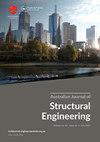采用建筑产品国际协调标准制定AS 5216的方法
IF 0.9
Q4 ENGINEERING, CIVIL
Australian Journal of Structural Engineering
Pub Date : 2022-04-03
DOI:10.1080/13287982.2021.2019886
引用次数: 1
摘要
随着国际贸易的发展,一国设计规则在另一国使用的情况越来越多。然而,对于建筑产品,个别国家仍然要求对其自己的建筑法规的设计规则进行符合性评估。由于设计格式和材料性能规格的差异,直接采用设计规则通常是不可行的。本文阐述了采用国际设计程序制定澳大利亚混凝土金属锚(紧固件)标准AS 5216的过程。原来的欧洲设计条款已适应澳大利亚的使用。本文概述了在国际协调混凝土金属锚结构设计的适应过程中需要考虑的因素。此外,本文还论证了澳大利亚国家建筑规范(NCC)中bv1验证方法的可行性及其在符合性论证方面的局限性。本文章由计算机程序翻译,如有差异,请以英文原文为准。
Methodology for development of AS 5216 using international harmonisation of construction products standard
ABSTRACT The adaptation of the design rules from one country for use in another country is becoming more frequent with growing international trade. For construction products, an individual country, however, still requires conformity assessment of the design rules to its own building regulation. Direct adoption of the design rule is usually not feasible due to differences in design format and material properties specifications. This paper demonstrates the process of adaptation of international design procedures to develop the Australian Standard AS 5216 for metal anchors (fasteners) in concrete. The original European design provisions has been adapted for Australian use. The paper outlines what factors need to be considered in the adaptation process for international harmonisation of structural design for metal anchors in concrete. Furthermore, the paper demonstrates the workability ofBV1 Verification Method in the Australian National Construction Code (NCC) and its limitations for the purpose of demonstration of conformity.
求助全文
通过发布文献求助,成功后即可免费获取论文全文。
去求助
来源期刊

Australian Journal of Structural Engineering
ENGINEERING, CIVIL-
CiteScore
2.50
自引率
0.00%
发文量
31
期刊介绍:
The Australian Journal of Structural Engineering (AJSE) is published under the auspices of the Structural College Board of Engineers Australia. It fulfils part of the Board''s mission for Continuing Professional Development. The journal also offers a means for exchange and interaction of scientific and professional issues and technical developments. The journal is open to members and non-members of Engineers Australia. Original papers on research and development (Technical Papers) and professional matters and achievements (Professional Papers) in all areas relevant to the science, art and practice of structural engineering are considered for possible publication. All papers and technical notes are peer-reviewed. The fundamental criterion for acceptance for publication is the intellectual and professional value of the contribution. Occasionally, papers previously published in essentially the same form elsewhere may be considered for publication. In this case acknowledgement to prior publication must be included in a footnote on page one of the manuscript. These papers are peer-reviewed as new submissions. The length of acceptable contributions typically should not exceed 4,000 to 5,000 word equivalents. Longer manuscripts may be considered at the discretion of the Editor. Technical Notes typically should not exceed about 1,000 word equivalents. Discussions on a Paper or Note published in the AJSE are welcomed. Discussions must address significant matters related to the content of a Paper or Technical Note and may include supplementary and critical comments and questions regarding content.
 求助内容:
求助内容: 应助结果提醒方式:
应助结果提醒方式:


